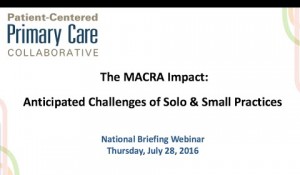You are looking at an archived version of our site. Please visit thepcc.org for a fresh, new experience!
High-Value

- Primary care achieves excellent, equitable outcomes for individuals and families, including using health care resources wisely and considering costs to patients, payers and the system.
- Primary care practices employ a systematic approach to measuring, reporting and improving population health, quality, safety and health equity, including partnering with individuals, families and community groups.
- Primary care practices deliver exceptionally positive experiences for individuals, families, staff and clinicians
Resources
June 2024
Geographic variation in overscreening for colorectal, cervical, and breast cancer among older adults
JAMA Network Open - July 2020
Family Practice - June 2020
Investing in Primary Care and Dismantling Fee-For-Service - May 2019
Health Services Research - December 2018
Health Services Research - November 2018
American Journal of Managed Care - August 2018
This resource looks at a chronic care program designed to manage patients with comorbid HIV patients enrolled in Medicaid to see how the program affected costs. The study showed that costs were reduced by over $200 per patient per month. This shows how the PCMH model can lead to higher-value, more efficient care.
Heart (BMJ Journal) - August 2018
January 2018
This resource acts as a guide for employers to promote high-value care. It encourages stronger relationships between patients and their primary care physicians, promotes transparency, and suggests supporting policies that strengthen primary care. All of this emphasizes the importance of primary care utilization in the realization of high-value care.
HHS Office of the Inspector General - August 2017
This resource looks at how ACOs can produce higher-value care by improving quality while reducing costs. The study looks at data measuring spending and quality over the first three years of the Medicare Shared Savings Program. Overall, spending was reduced by about $1 billion, while quality measures improved over the three years.
JAMA Internal Medicine - July 2017
Glucose Self-monitoring in Non–Insulin-Treated Patients With Type 2 Diabetes in Primary Care Settings - June 2017
Payment Methods and Benefit Designs: How They Work and How They Work Together to Improve Health Care
Urban Institute & Catalyst for Payment Reform - May 2016
This resource discusses a project conducted that looks at how payment methods and benefit designs can work together to improve quality and increase value of care. This intersection should be considered when moving forward with reforms that aim to create more high-value care.
JAMA Internal Medicine - September 2015
This study looks at how accountable care organizations (ACOs) improve healthcare efficiency by decreasing the provision of low-value care that provides minimal clinical benefits. It concluded that these type of risk-contracts may discourage use of low-value services and lead to more high-value care.
Annals of Family Medicine - July 2015
This survey looks at how primary care physicians are compensated based on whether they are in ACO or non-ACO practices. Participation in ACOs was associated with significantly higher physician compensation for quality. This study helps to show how ACOs can be optimally structured for the highest-value.
Webinars
Secondary menu
Copyright © 2024 Primary Care Collaborative



















